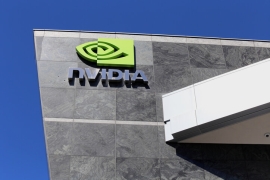Archived article
Please note that tax, investment, pension and ISA rules can change and the information and any views contained in this article may now be inaccurate.

Investors are increasingly focused on the minutiae rather than the big picture with Nvidia. That’s a natural evolution as the more people zoom in on a company, the more they learn about it, and the more granular detail they want.
At face value, Nvidia has once again generated the kind of growth that most companies will never achieve in their lifespan. However, the share price fell in response to its latest quarterly results.
Investors focused on a quarter-on-quarter decline in gross margins, with guidance for them to fall further in the coming quarter, and weaker than expected forward guidance for revenue.
Is the margin issue reason to panic?
Investors have enjoyed stellar share price gains from Nvidia over the past two years and that’s made them think it is invincible. In reality, a small decline in margins is not a reason to panic, particularly when they are still over 70% which many companies could only dream of. Nvidia is confident margins will rebound as production volumes ramp up for its Blackwell chips.
Nvidia has a habit of under-promising and over-delivering when it comes to earnings and revenue, which is remarkable when you consider how bullish its commentary is. Chief executive Jensen Huang is far from modest; he’s the biggest fan of AI imaginable, and always makes a convincing case for the business and the significant opportunity ahead.
The numbers speak for themselves. Nvidia has beaten earnings and revenue forecasts for eight consecutive quarters. The scale of the latest beat was decent – earnings were 8% ahead of expectations, better than the 6.25% beat achieved in the previous quarter, although below the double-digit beats seen across four sets of quarterly results between May 2023 and February 2024.
To say Nvidia is bullish about AI changing the world is an understatement. It used the term ‘incredible’ 10 times in the analyst conference call and says demand for its Blackwell chip is ‘staggering’.
Will a Trump presidency and antitrust concerns hurt Nvidia?
Nvidia is the poster child for the AI revolution. It is at the epicentre for the explosive growth in machine learning and automation, with AI being embraced by every industry imaginable on a global basis. Its chips are at the top of every company’s shopping list because it has become the hallmark for all things AI. Therein lies a big problem.
The more successful Nvidia becomes, the greater the potential for an antitrust clampdown. It’s rare for a company to dominate an industry to the extent by which Nvidia has done with AI-related chips. At the moment, it feels as if rival chip companies are only getting a bite of the cherry if customers cannot obtain Nvidia products. Everyone else is second choice.
Competition authorities might want to know if Nvidia has simply been lucky or whether it is doing something not quite right. There have been suggestions that Nvidia might be making it hard for customers to switch to other vendors and/or giving preferential prices to customers who exclusively use its products.
Nvidia says ‘the age of AI is upon us, and it’s large and diverse’. That implies there should be room in the market for multiple chip companies to prosper. It feels like the market is balanced too much in Nvidia’s favour at present, which is something that investors need to think about.
If antitrust risks aren’t an immediate worry for the market, there is something else for investors to chew on and that’s the potential for Donald Trump to take a more aggressive stance on China accessing US technology.
Nvidia is currently blocked from selling its most advanced chips to China as part of broader measures to prevent the Asian superpower from using Western technology to augment its military capability. China is still able to buy older Nvidia products and the chip company is expected to generate billions of dollars in revenue from this country in 2024.
Once Trump returns to the White House, he could easily tighten the restrictions on US technology sold into China which could have a negative impact on Nvidia’s earnings. It’s a real risk and something to watch closely once the president-elect has settled back into the Oval Office.
Nvidia made a point in its results conference call of saying it will continue to comply with export controls, suggesting it may not fight tighter restrictions. If a clamp-down does happen, it would cause a wobble to the company’s earnings, but it’s not as if demand is weak elsewhere in the world. Nvidia might simply accept its fate and move on, focusing on where it can grow and prosper.
Ways to help you invest your money
Put your money to work with our range of investment accounts. Choose from ISAs, pensions, and more.
Let us give you a hand choosing investments. From managed funds to favourite picks, we’re here to help.
Our investment experts share their knowledge on how to keep your money working hard.
Related content
- Fri, 13/06/2025 - 11:30
- Mon, 09/06/2025 - 10:43
- Fri, 06/06/2025 - 11:25
- Fri, 30/05/2025 - 13:55

